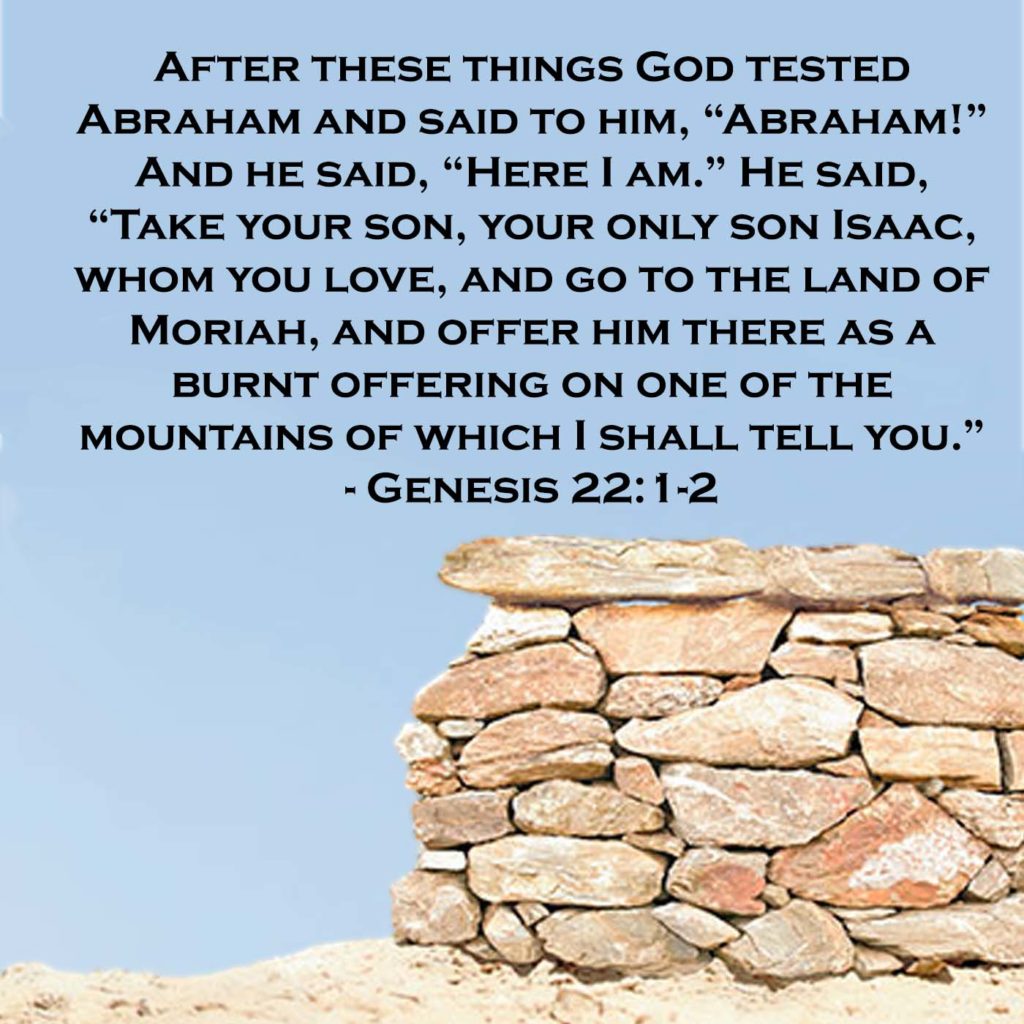
1 After these things God tested Abraham and said to him, “Abraham!” And he said, “Here I am.” 2 He said, “Take your son, your only son Isaac, whom you love, and go to the land of Moriah, and offer him there as a burnt offering on one of the mountains of which I shall tell you.”
Several years have passed since Isaac was born. Abraham and his family have settled into Beersheba, benefitting greatly from the alliance with Abimelech. Everything seems to be going well. Then God decides to test Abraham. He calls to Abraham, who immediately responds. God tells Abraham to do something quite drastic. Abraham is to take Isaac, the son God promised him, and offer him up as a sacrifice.
Note that God specifies Isaac as Abraham’s only son. God wants Abraham to be sure that when it come to his covenant promises, only Isaac is included, and Ishmael has no part.
3 So Abraham rose early in the morning, saddled his donkey, and took two of his young men with him, and his son Isaac. And he cut the wood for the burnt offering and arose and went to the place of which God had told him.
Abraham’s response in obedience is immediate. He doesn’t know why God would require him to sacrifice Isaac, but he knows God promised to make Isaac into a great nation, and that cannot happen if Isaac is dead. His faith in God is unwavering even in the most terrible of circumstances. However, it is a long walk from Beersheba to Moriah, and Abraham will have plenty of opportunity to change his mind.
4 On the third day Abraham lifted up his eyes and saw the place from afar. 5 Then Abraham said to his young men, “Stay here with the donkey; I and the boy will go over there and worship and come again to you.” 6 And Abraham took the wood of the burnt offering and laid it on Isaac his son. And he took in his hand the fire and the knife. So they went both of them together.
It is three days into the journey before the finally see Mount Moriah. Resolute, Abraham leaves behind their servants, and loads Isaac up with wood, suggesting that Isaac is now in his early teenage years and capable of carrying such a load, and takes the torch they will need to light the fire, and the knife. He still plans on following through in obedience.
The language that Abraham uses when speaking to his servants suggest that he is fully expecting both him and Isaac to return. Some translations even say “we will both return to you.” Abraham has reasoned that God must always keep his promises, so even if Isaac is killed God will somehow bring him back.
7 And Isaac said to his father Abraham, “My father!” And he said, “Here I am, my son.” He said, “Behold, the fire and the wood, but where is the lamb for a burnt offering?” 8 Abraham said, “God will provide for himself the lamb for a burnt offering, my son.” So they went both of them together.
As they are climbing up the mountain, Isaac has a realization. They have wood, and fire, and everything else needed for a sacrifice, except the animal being sacrificed. Isaac has likely worship God via sacrifice in the past with his father, he knows the ins and outs of a sacrifice. He questions his father, who responds simply that God will provide. While being slightly deceptive in his answer, Abraham may full and well believe that God will provide, as God has already provided Isaac, and will provide away for Isaac to be saved.
9 When they came to the place of which God had told him, Abraham built the altar there and laid the wood in order and bound Isaac his son and laid him on the altar, on top of the wood.
They reach the top and build the altar. While Isaac was helping place the wood, Abraham managed to tie him up and place him on the altar. Isaac would be terrified, and probably struggling against Abraham.
10 Then Abraham reached out his hand and took the knife to slaughter his son. 11 But the angel of the LORD called to him from heaven and said, “Abraham, Abraham!” And he said, “Here I am.” 12 He said, “Do not lay your hand on the boy or do anything to him, for now I know that you fear God, seeing you have not withheld your son, your only son, from me.”
Abraham is seconds away from killing his own son, his resolve has not broken, he has remained obedient, and he has kept his faith in God. Now with the knife in his hand, God calls out to him to stop. The test is over, he has passed, and Isaac is unharmed. God knows that nothings stands in the way of Abraham’s faith.
13 And Abraham lifted up his eyes and looked, and behold, behind him was a ram, caught in a thicket by his horns. And Abraham went and took the ram and offered it up as a burnt offering instead of his son. 14 So Abraham called the name of that place, “The LORD will provide”; as it is said to this day, “On the mount of the LORD it shall be provided.”
God reveals a lost ram stuck in the brush, providing for Himself an offering as Abraham had told Isaac. They sacrifice the ram in place of Isaac. And Abraham names the place “Yahweh Yirah” (or Jehovah Jirah), which means the Lord provides. Interestingly enough this name is later used as one of the names of God, while the place becomes known as the mount of the Lord, or Mount Zion, and it will be where God’s temple will later be built
At this point I want to stop and point out much of the messianic imagery of this passage. In almost exact parallel, Jesus, the son of God and promised Savior, will be provided by God as a sacrifice for the world. Jesus would be loaded up with the cross, the wood for his sacrifice, and carry it up a hill, near mount Moriah, where God will bring his wrath upon him so much so that He feels betrayed by God. This passage becomes a prophecy of the lamb of God provided to take away the sins of the world.
15 And the angel of the LORD called to Abraham a second time from heaven 16 and said, “By myself I have sworn, declares the LORD, because you have done this and have not withheld your son, your only son, 17 I will surely bless you, and I will surely multiply your offspring as the stars of heaven and as the sand that is on the seashore. And your offspring shall possess the gate of his enemies, 18 and in your offspring shall all the nations of the earth be blessed, because you have obeyed my voice.”
With the offering completed and the test over God reiterates his promises to Abraham, but this time specifically echoing the promises over Abraham’s offspring, Isaac, who is likely hearing the words of God here as well. God is now officially passing on the covenant blessing from Abraham to Isaac.
19 So Abraham returned to his young men, and they arose and went together to Beersheba. And Abraham lived at Beersheba.
Abraham and Isaac return home, possibly shaken by the entire encounter, but in a better relationship with God then before.
20 Now after these things it was told to Abraham, “Behold, Milcah also has borne children to your brother Nahor: 21 Uz his firstborn, Buz his brother, Kemuel the father of Aram, 22 Chesed, Hazo, Pildash, Jidlaph, and Bethuel.” 23 (Bethuel fathered Rebekah.) These eight Milcah bore to Nahor, Abraham’s brother. 24 Moreover, his concubine, whose name was Reumah, bore Tebah, Gaham, Tahash, and Maacah.
As the years go by, word comes to Abraham about his family in Uz and Haran, who he left several decades ago. He hears about his brother’s offspring, that they have a sizable family. It is from these relatives that a future wife for Isaac will be found, the next step in him becoming a great nation, as God has promised.
The Holy Bible: English Standard Version. (2016). (Ge 22:1–24). Wheaton, IL: Crossway Bibles.
